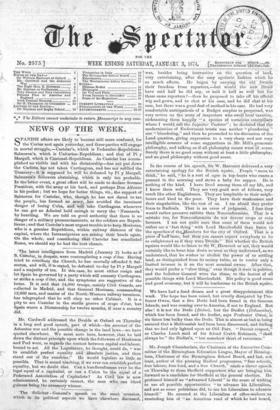In the course of his speech, Sir W. Harcourt delivered
a.very entertaining apology for the British squire. People "seem to think," he said, "he is a sort of ogre iu top-boots who roasts a peasant in the morning and stews a baby for supper.. He is nothing of the kind. I have lived among them all my life, and I know them well. They are very good sort of fellows, very much like other Englishmen. They are hospitable to their neigh- bours and kind to the poor: They have their weaknesses and their singularities, like the rest of us. I am afraid they prefer foxes to Radicals. That is an error of judgment. I fear they would rather preserve rabbits than Nonconformists. That is a mistake too, for Nonconformists do not devour crops or ruin farmers. I am not quite sure that some of them would not rather see a 'fast thing' with Lord Macclesfield than listen to the speeches of the„Members for the city of Oxford. That is a piece o taZiaste, but then you cannot expect everybody to be as enlightened as if they were Druids." But whether the British squires would like to listen to Sir W.Harcourt or not, they would certainly like to hunt him down so soon as they understand, as we understand, that he wishes to abolish the power of so settling land, as distinguished from its money value, as to confer only a limited interest in it on the next nominal owner. After that, they would prefer a "slow thing," even though it were in politics, and the Solicitor-General were the chase,- to the fastest of all possible things with Lord Macclesfield. His policy is good sense and good economy, but it will be loathsome to the British squire.










































 Previous page
Previous page